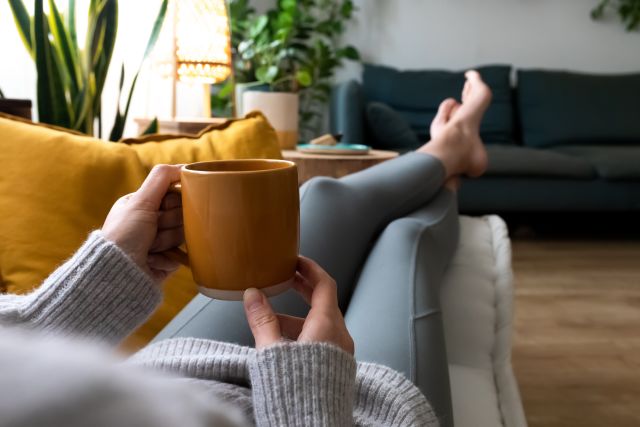Updated on July 28, 2023.
If there’s one food at the grocery store that has an outsized share of stress-relieving claims, it’s probably tea. You may have read the package labels promising "calming,” “soothing,” “easing,” or “stress-busting” benefits. You might have even experienced them for yourself: wrapping your hands around a warm mug, inhaling the aroma, and ticking the stress levels down a notch with each sip.
But is there something inherent in tea that provides these properties, or is it merely a placebo effect? (You feel stressed, you want this tea to help you unwind, and, lo and behold, you start to feel calmer.)
Turns out, there is some science to show that certain constituents of tea may help reduce stress levels from boil to simmer.
Green and black tea may ease stress
Drinking a cup of tea may indeed help quell minor bouts of anxiety, according to a review of research published in Phytomedicine in 2017. According to the study, even inhaling the aroma of green tea is linked to decreased stress and anxiety.
How does tea work to reduce stress? Two chemicals found in green and black tea are thought to be responsible for the stress-relieving and brain-boosting effects.
One is a flavonoid called epigallocatechin gallate (EGCG). The other is an amino acid called L-theanine. Flavonoids are antioxidant chemicals that help prevent cellular damage in the body while helping to reduce inflammation. Amino acids have a range of functions in the body, including serving as the building blocks of proteins.
There hasn’t been a lot of research to date on the effects of EGCG alone in humans, but in a key 2012 study published in Appetite, participants reported that they felt calmer and less stressed after consuming 300 mg of EGCG compared to participants who only had a placebo. (It’s worth noting that the amounts used in studies are often higher than you’d find in typical serving sizes. You’d have to drink around three to six 8-ounce servings of green tea, for example, to reach 300 mg of EGCG.)
In another 2016 study in Nutrients, participants who ingested an L-theanine-based drink (equivalent to roughly eight cups of green tea) had reduced stress responses during a mildly stressful task one hour later, compared to people who had a placebo.
The aroma of black tea may also have a stress-quelling effect. In one 2018 study published in Journal of Physiological Anthropology, inhaling the aroma of two types of popular black teas, Darjeeling and Assam, reduced levels of a biological stress marker in participants who were asked to complete a difficult math assignment. This research builds on previous findings that drinking black tea can increase feelings of relaxation while reducing levels of the stress hormone cortisol.
Herbal teas can help calm stress and anxiety and may help with sleep
Some herbal teas, which are naturally caffeine-free, are also known for their stress-relieving effects.
According to the National Center for Complementary and Integrative Health, chamomile tea may be helpful for those with generalized anxiety and is generally safe to use over the short term. One 2019 review and meta-analysis in particular published in Phytotherapy Research showed that chamomile helped relieve symptoms of generalized anxiety disorder and contributed to improvements in sleep, with only mild side effects reported. More research is needed, however, to further support these potential benefits.
Lavender is another popular herbal tea that’s often associated with stress relief, and it may have a benefit for general mental health as well. In one 2020 study published in Complementary Therapies in Medicine, 60 older adults were assigned to a group drinking lavender tea twice a day or to a control group. After two weeks, the participants who drank lavender tea reported lower measures of depression and anxiety.
Finding the right tea for you
What tea you choose depends on your taste and what works for your lifestyle. Some people are more sensitive to the stimulating effects of caffeine, found in varying levels in green or black teas. If caffeine jazzes you up rather than calms you down, you might want to opt for chamomile, lavender, or other caffeine-free herbal teas.
Remember also that if a product like tea can produce stress-relieving or anxiety dampening effects, it means there are chemicals working on your body that could interact with medications or other supplements you may be taking. If you plan to add tea to your everyday routine, check in with a healthcare provider first to make sure that it will fit in with your overall well-being and with any treatment plans you may have in place.







